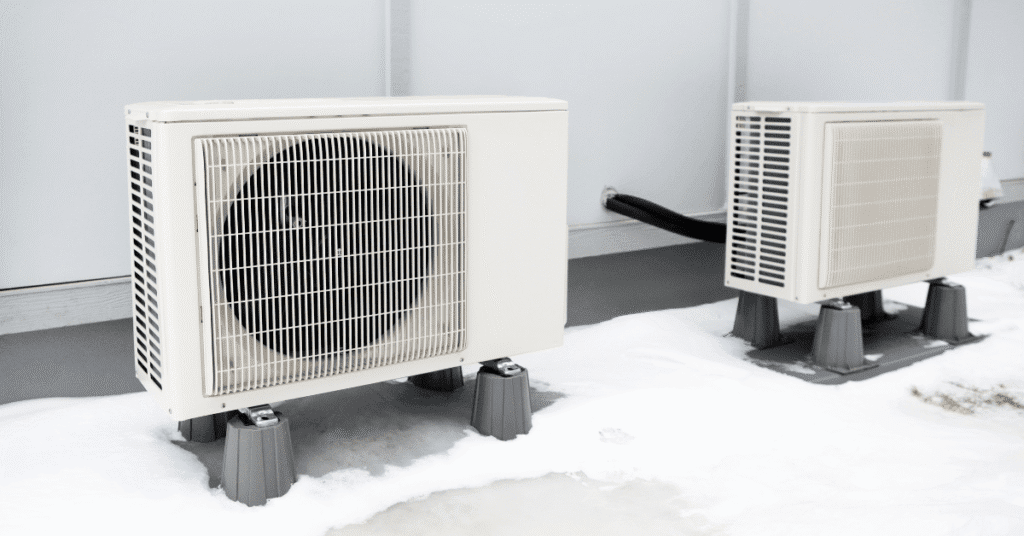The first snow of a Michigan winter often brings more than just a white landscape. It’s a reminder of how much we depend on a reliable heating system. When the wind howls off the Great Lakes and temperatures drop into the teens, Michigan homeowners need equipment that won’t let them down.
Furnace vs Heat Pump: Which Works Best in Michigan?
For many, the big question becomes whether a traditional furnace or a modern heat pump is the smarter choice. Both systems can keep your home comfortable, but they work in very different ways. Understanding how each performs in Michigan’s demanding climate can help you make a decision that balances comfort, cost, and long-term value.
Michigan’s Climate and Heating Demands
Michigan is known for its weather extremes. Long, cold winters with heavy snowfall are followed by hot, humid summers. That means most homes need a heating system capable of handling both ends of the spectrum.
In winter, the challenge is to generate heat through months of below-freezing nights. In summer, reliable cooling becomes just as important. The right HVAC system should heat and cool efficiently while keeping energy bills in check. For many families in Livonia and across the state, the choice often comes down to a furnace, a heat pump, or even a dual fuel installation.
What Is a Furnace?
How Furnaces Work
A furnace creates heat by burning natural gas, propane, or using an electric furnace system. The warm air is pushed through ductwork and distributed evenly throughout the home. Furnaces generate heat directly, making them strong performers in extreme cold.
Benefits of Furnaces in Michigan
- Powerful heating capacity: Furnaces excel at keeping your home warm even in extreme cold.
- Reliable in sub-zero weather: Unlike some heat pumps, a gas furnace will not lose output on cold days.
- Proven technology: Service, cleaning, and repair for furnaces are widely available across Michigan.
Drawbacks to Consider
- Operating costs depend on natural gas or propane prices.
- A furnace only provides heating, so an air conditioner is still needed for summer cooling.
- Combustion models use fossil fuel and release emissions, which may concern eco-minded homeowners.
What Is a Heat Pump?
How Heat Pumps Work
A heat pump doesn’t burn fuel to generate heat. Instead, it transfers heat from outside the home into your living space. In summer, it reverses and works like an air conditioner. A heat pump is an energy-efficient system because it moves heat instead of creating it.
Benefits of Heat Pumps in Michigan
- Energy efficiency: A heat pump could save money in milder weather, consuming less energy than a furnace.
- Two-in-one system: A single unit handles both heating and cooling.
- Cleaner operation: Heat pumps use electricity and avoid burning fossil fuel.

Limitations in Cold Climates
- Performance drops when temperatures sink below 20°F.
- Heat pumps may require a furnace as a backup during Michigan winters.
- Installation cost is typically higher than that of a furnace.
Furnace vs Heat Pump: Side-by-Side Comparison
Heating Efficiency
- Furnace: Consistent heating in extreme cold, even during Michigan winters.
- Heat Pump: Highly efficient in spring and fall but less effective on the coldest days.
Upfront Installation Costs
- Furnace installation is generally cheaper than the cost of a heat pump.
- A heat pump installation cost is higher but offers year-round benefits.
Operating Costs
- Furnaces rely on natural gas, propane, or oil furnace fuel. Costs fluctuate with the energy market.
- Heat pumps use electricity, which is more stable in pricing but varies by provider.
Environmental Impact
- Furnaces and heat pumps differ in emissions: furnaces release carbon, while heat pumps use electricity and can pair with renewable energy.
When a Furnace Makes Sense in Michigan
A furnace may be the better option if you:
- Live in places like Michigan with extended periods of extreme cold.
- Have access to affordable natural gas or propane.
- Already have ductwork designed for a furnace installation.
When a Heat Pump Works Best in Michigan
A heat pump would be a smart solution if you:
- Want one system to heat or cool your home year-round.
- Prefer to reduce household emissions by using an electric heat pump vs gas.
- Are focused on energy efficiency during moderate seasons.

Dual Fuel Systems: The Balanced Option
For many Michigan homeowners, the best for Michigan conditions is a dual fuel system combining both.
- The heat pump handles heating in moderate weather.
- The furnace will kick in automatically when the temperature drops too low.
- Together, the system ensures energy efficiency in extreme cold and reliability during the heating season.
This combination balances cost, efficiency, and comfort in climates like Michigan.
Types of Heat Pumps to Consider
- Air-source heat pump: The most common type of heat pump; transfers heat from outside air.
- Ground-source heat pump / geothermal heat pump: Extracts heat from the ground; provides geothermal heat but has higher installation cost.
- Mini-split heat pump / ductless mini-split heat pump: Great for homes without ducts.
- Electric heat pump vs gas furnace: Electric units are cleaner, while gas furnaces and heat pumps deliver stronger output in cold climates.
The Importance of Professional Installation and Maintenance
No matter which system you choose, professional installation is critical. An oversized furnace or incorrectly installed heat pump system can lead to wasted energy and frequent repair issues.
Regular cleaning and maintenance such as filter replacement, ductwork inspection, and seasonal tune-ups extend the life of your heating system. Annual service helps prevent costly breakdowns and improves energy efficiency.
At Comfort Craftsman Heating and Cooling, we provide:
- Furnace repair, installation, and cleaning services.
- Heat pump installation and seasonal maintenance tailored for Michigan homes.
- Ductwork repair and indoor air quality improvements.
- Emergency heating repair when unexpected issues arise.

Conclusion – Making the Right Choice for Michigan Homes
Michigan winters demand powerful heating, and both furnaces and heat pumps have advantages. Furnaces are efficient in extreme cold, while heat pumps provide two-in-one heating and cooling and shine in moderate weather.
For many households, a dual fuel setup with a furnace and heat pump is the most reliable option. Whether a heat pump or furnace is right for you depends on your budget, energy costs, and comfort preferences.
Comfort Craftsman Heating and Cooling is ready to help Michigan homeowners with expert advice, installation, and ongoing HVAC services to keep your home safe and warm year-round.







